 PDF button on the scanner. See Scanning Using the PDF Button for instructions.
PDF button on the scanner. See Scanning Using the PDF Button for instructions. |
 |
|
||
 |
||||
Scanning to a PDF File
The easiest way to scan multiple document pages to a PDF file is to press the  PDF button on the scanner. See Scanning Using the PDF Button for instructions.
PDF button on the scanner. See Scanning Using the PDF Button for instructions.
 PDF button on the scanner. See Scanning Using the PDF Button for instructions.
PDF button on the scanner. See Scanning Using the PDF Button for instructions.Using Epson Scan, you can create a PDF file with the following features.
Scanning multiple document pages into a single PDF file: You can scan multiple document pages and save them in a single PDF file.
Creating a searchable PDF file: You can create a PDF file with search functionality, so that you can look for words in the file. (This feature may not be available in some countries.)
Assigning document security settings: You can assign password settings to the PDF file.
Specifying the number of pages in a single PDF file: You can specify the maximum number of pages that can be included in one PDF file. For example, if you are scanning a 20-page document, and specify the page number to be included in one PDF as 4, 5 PDF files are automatically created.
 Note:
Note:|
You need ABBYY FineReader Sprint Plus that came with your scanner to use some of these features. If you have installed your scanning software as described in the Start Here sheet, it has already been installed. (ABBYY FineReader Sprint Plus may not be available in some countries.)
|
See one of these sections to start scanning to a PDF file.
Office Mode: Scanning to a PDF File in Office Mode
Home Mode: Scanning to a PDF File in Home Mode
Professional Mode: Scanning to a PDF File in Professional Mode
Scanning Using the PDF Button
 |
Place your document on the document table or in the ADF. See Placing Documents or Photos or Loading Documents in the Automatic Document Feeder for instructions.
|
 |
Press the
 PDF button on the scanner. You see the Scan to PDF window. PDF button on the scanner. You see the Scan to PDF window. |
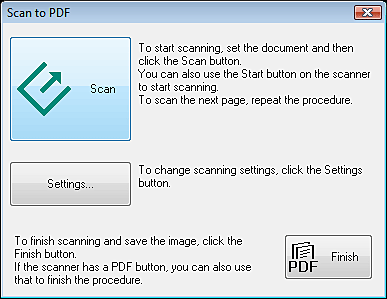
 |
Click Settings. You see the Scan to PDF Settings window.
|

 |
Select Color, Grayscale, or Black&White as the Image Type setting to select the colors in the original.
|
 |
Select one of these settings as the Document Source setting.
|
Auto Detect: This setting automatically determines whether to load your document from the ADF or scan it from the document table.
Document Table: Select this setting when you want to scan using the document table.
ADF: Select this setting when you want to scan using the ADF.
 |
Click the arrow to open the Size list and select the size of your original(s).
|
 |
If you need to select a size that is not in the Size list, you can create a custom size. Click the arrow in the Size list and select Customize. You see the Source Size window.
|
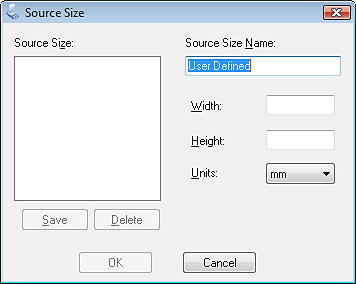
Type a name for your custom size, enter the size, click Save, then click OK. Your new size appears in the Size list.
 |
Click the arrow next to the Resolution list and select the number of dots per inch at which you want to scan. See the table below for guidelines.
|
|
What you will do with the scanned image
|
Suggested scan resolution
|
|
Send via e-mail, upload to web, view only on the screen
|
96 to 150 dpi
|
|
Fax
|
200 dpi
|
|
Print
|
300 dpi
|
 |
Use the settings in the Image Adjustments area of the window to modify the image quality if necessary. See the table below for guidelines.
|
|
Setting
|
Description
|
|
Brightness
|
Adjusts the overall image lightness and darkness. This setting is available only when the image type is set to Color or Grayscale.
|
|
Contrast
|
Adjusts the difference between the light and dark areas of the overall image. This setting is available only when the image type is set to Color or Grayscale.
|
|
Unsharp Mask
|
Turn on to make the edges of image areas clearer for an overall sharper image. Turn off to leave softer edges.This setting is available only when the image type is set to Color or Grayscale.
|
|
Descreening
|
Removes the rippled pattern that can appear in subtly shaded image areas, such as skin tones. Also improves results when scanning magazine or newspaper images that include screening in their original print process. This setting is available only when the image type is set to Color or Grayscale.
|
|
Text Enhancement
|
Enhances text recognition when scanning text documents.
|
|
Threshold
|
Adjusts the level at which the black areas in text and line art are delineated, improving text recognition in OCR programs. This setting is available only This setting is available only when the image type is set to Black&White.
|
 |
Click File Save Settings. The File Save Settings window appears. The current Paper Size, Orientation, Margin, and other settings are displayed below it.
|
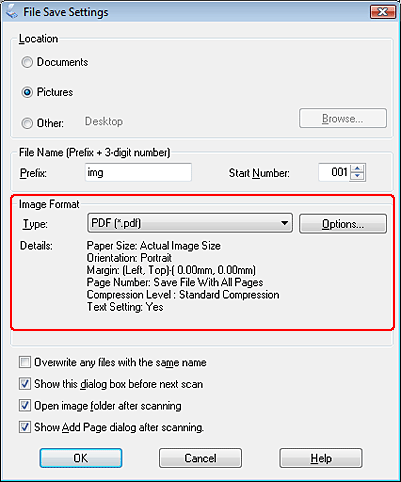
 |
If you need to change any of the current PDF settings, click Options. You see the EPSON PDF Plug-in Settings window.
|
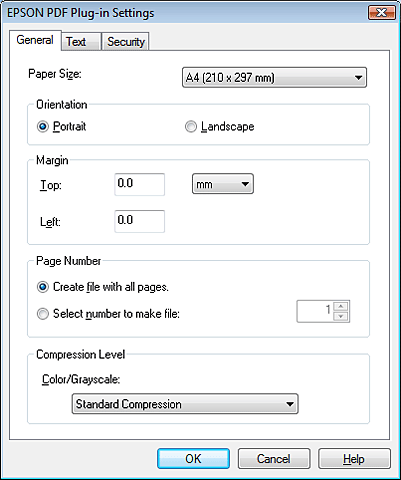
Select the settings that match your document and click OK. You return to the File Save Settings window.
 Note:
Note:
 Note:
Note:|
The Text tab is available only when ABBYY FineReader Sprint Plus is installed. If ABBYY FineReader Sprint Plus is not available in your country, you will not see the Text tab.
|
 |
Make any other file save settings, and click OK.
|
 |
Click Close to close the Scan to PDF window, then click Scan or press the
 Start button on the scanner. Epson Scan scans your page. Start button on the scanner. Epson Scan scans your page. |
 |
If you are scanning multiple pages using the document table, replace the first page on the document table with the second page and click Scan or press the
 Start button again. Repeat this step for each page in your document. Start button again. Repeat this step for each page in your document. |
If you are scanning more than 40 pages, you can load the rest of the pages into the ADF and click Scan or press the  Start button again to continue.
Start button again to continue.
 Start button again to continue.
Start button again to continue. |
When you are finished, click Finish or press the
 PDF button on the scanner. Your document is saved as a PDF file in the Pictures or My Pictures folder, or in the location you selected in the File Save Settings window. PDF button on the scanner. Your document is saved as a PDF file in the Pictures or My Pictures folder, or in the location you selected in the File Save Settings window. |
Scanning to a PDF File in Office Mode
 |
Place your document on the document table or in the ADF. See Placing Documents or Photos or Loading Documents in the Automatic Document Feeder for instructions.
|
 |
Start Epson Scan. See Starting Epson Scan for instructions.
|
 |
In the Office Mode window, select the Image Type, Document Source, Size, and Resolution settings. For details, Scanning in Office Mode.
|
 |
Click Preview to preview your image(s), then select your scan area. For details, see Previewing and Adjusting the Scan Area.
|
 |
Make any other necessary image adjustments. See Adjusting the Color and Other Image Settings for details.
|
 |
Click Scan. The File Save Settings window appears.
|
 |
Select PDF as the Type setting. The current Paper Size, Orientation, Margin, Page Number, Compression Level, and Text Setting settings are displayed below it.
|

 |
Click Options. You see the EPSON PDF Plug-in Settings window.
|
To create a searchable PDF file, click the Text tab, select the Create searchable PDF check box, then select your language from the Text Language list.
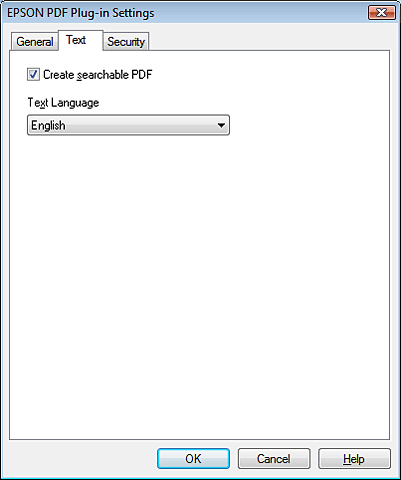
 Note:
Note:|
The Text tab is available only when ABBYY FineReader Sprint Plus is installed. If ABBYY FineReader Sprint Plus is not available in your country, you will not see the Text tab.
|
To assign password settings to the PDF file, click the Security tab and select the password settings.
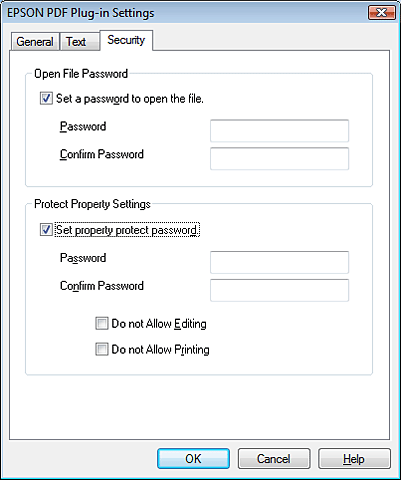
To specify the maximum number of pages that can be included in one PDF file, click the General tab and adjust the Select number to make file setting.

For other settings in the EPSON PDF Plug-in Settings window, see Epson Scan Help for details.
 |
Select the settings that match your document and click OK. You return to the File Save Settings window.
|
 |
Make any other file save settings, and click OK. Epson Scan scans your document and displays the window below.
|
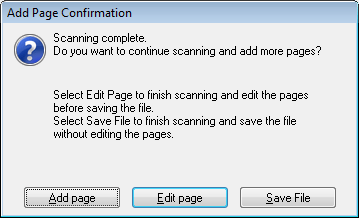
 Note:
Note:|
If you deselect the Show Add Page dialog after scanning check box in the File Save Settings window, this window does not appear and Epson Scan automatically saves your document.
|
 |
Select one of the following options.
|
Add page: Click this button to scan the next page of your document. Replace the first page on the document table with the next page, and click Scan. Repeat this step for each page in your document. When you are finished, click Edit page and go to step 12.
Edit page: Click this button if you have scanned all the necessary pages so you can edit the scanned pages before saving them in one PDF file. Then go to step 12.
Save File: Click this button when you are ready to finish scanning and save the scanned pages into one PDF without editing them. Then go to step 14.
 |
You see the Editing Page window displaying thumbnail images of each scanned page.
|
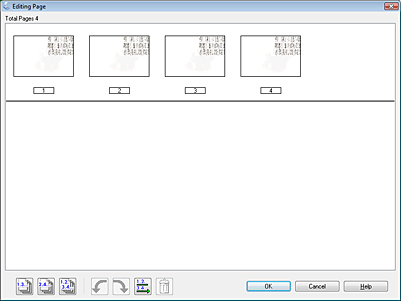
Use the tools at the bottom of the Editing Page window to select, rotate, reorder, and delete pages.
If you want to include all the document pages in your PDF files as they currently look, go to step 13.
If you want to rotate pages, click the pages, or use the  odd pages,
odd pages,  even pages, or
even pages, or  all pages icon to select the pages, then click the
all pages icon to select the pages, then click the  left or
left or  right rotate icon to rotate them.
right rotate icon to rotate them.
 odd pages,
odd pages,  even pages, or
even pages, or  all pages icon to select the pages, then click the
all pages icon to select the pages, then click the  left or
left or  right rotate icon to rotate them.
right rotate icon to rotate them.If you want to delete pages, click the pages, or use the  odd pages, or
odd pages, or  even pages icon to select the pages, then click the
even pages icon to select the pages, then click the  delete icon to delete them.
delete icon to delete them.
 odd pages, or
odd pages, or  even pages icon to select the pages, then click the
even pages icon to select the pages, then click the  delete icon to delete them.
delete icon to delete them.  Note:
Note:|
The
 delete icon is not available when all pages are selected. delete icon is not available when all pages are selected. |
For further details on the tools in the Editing Page window, see Epson Scan Help.
 |
When you have finished editing your pages, click OK. The pages are saved in one PDF file in Pictures, My Pictures, or the location you selected in the File Save Settings window, and you return to the Office Mode window.
|
 |
Click Close to exit Epson Scan.
|
Scanning to a PDF File in Home Mode
 |
Place your document on the document table. See Placing Documents or Photos for instructions.
|
 Note:
Note:|
In Home Mode you can only scan from the document table. If you want to scan using the ADF, change to Office Mode or Professional Mode. See Changing the Scan Mode for details.
|
 |
Start Epson Scan. See Starting Epson Scan for instructions.
|
 |
In the Home Mode window, select the Document Type, Image Type, and Destination settings. For details, see Scanning in Home Mode.
|
 |
Click Preview to preview your image(s), then select your scan area. For details, see Previewing and Adjusting the Scan Area.
|
 |
Make any other necessary image adjustments. See Adjusting the Color and Other Image Settings for details.
|
 |
Size your image as necessary. See Selecting the Scan Size for details.
|
 |
Click Scan. The File Save Settings window appears.
|
 |
Select PDF as the Type setting. The current Paper Size, Orientation, Margin, Page Number, Compression Level, and Text Setting settings are displayed below it.
|

 |
Click Options. You see the EPSON PDF Plug-in Settings window.
|
To create a searchable PDF file, click the Text tab, select the Create searchable PDF check box, then select your language from the Text Language list.

 Note:
Note:|
The Text tab is available only when ABBYY FineReader Sprint Plus is installed. If ABBYY FineReader Sprint Plus is not available in your country, you will not see the Text tab.
|
To assign password settings to the PDF file, click the Security tab and select the password settings.

To specify the maximum number of pages that can be included in one PDF file, click the General tab and adjust the Select number to make file setting.

For other settings in the EPSON PDF Plug-in Settings window, see Epson Scan Help for details.
 |
Select the settings that match your document and click OK. You return to the File Save Settings window.
|
 |
Make any other file save settings, and click OK. Epson Scan scans your document and displays the window below.
|

 Note:
Note:|
If you deselect the Show Add Page dialog after scanning check box in the File Save Settings window, this window does not appear and Epson Scan automatically saves your document.
|
 |
Select one of the following options.
|
Add page: Click this button to scan the next page of your document. Replace the first page on the document table with the next page, and click Scan. Repeat this step for each page in your document. When you are finished, click Edit page and go to step 13.
Edit page: Click this button if you have scanned all the necessary pages so you can edit the scanned pages before saving them in one PDF file. Then go to step 13.
Save File: Click this button when you are ready to finish scanning and save the scanned pages into one PDF without editing them. Then go to step 15.
 |
You see the Editing Page window displaying thumbnail images of each scanned page.
|

Use the tools below the Editing Page window to select, rotate, reorder, and delete pages.
If you want to include all the document pages in your PDF files as they currently look, go to step 14.
If you want to rotate pages, click the pages, or use the  odd pages,
odd pages,  even pages, or
even pages, or  all pages icon to select the pages, then click the
all pages icon to select the pages, then click the  left or
left or  right rotate icon to rotate them.
right rotate icon to rotate them.
 odd pages,
odd pages,  even pages, or
even pages, or  all pages icon to select the pages, then click the
all pages icon to select the pages, then click the  left or
left or  right rotate icon to rotate them.
right rotate icon to rotate them.If you want to delete pages, click the pages, or use the  odd pages or,
odd pages or,  even pages icon to select the pages, then click the
even pages icon to select the pages, then click the  delete icon to delete them.
delete icon to delete them.
 odd pages or,
odd pages or,  even pages icon to select the pages, then click the
even pages icon to select the pages, then click the  delete icon to delete them.
delete icon to delete them.  Note:
Note:|
The
 delete icon is not available when all pages are selected. delete icon is not available when all pages are selected. |
For further details on the tools in the Editing Page window, see Epson Scan Help.
 |
When you have finished editing your pages, click OK. The pages are saved in one PDF file in Pictures, My Pictures, or the location you selected in the File Save Settings window, and you return to the Home Mode window.
|
 |
Click Close to exit Epson Scan.
|
Scanning to a PDF File in Professional Mode
 |
Place your document on the document table or in the ADF. See Placing Documents or Photos or Loading Documents in the Automatic Document Feeder for instructions.
|
 |
Start Epson Scan. See Starting Epson Scan for instructions.
|
 |
In the Professional Mode window, select the Document Type, Document Source, Auto Exposure Type, Image Type, and Resolution settings. For details, see Scanning in Professional Mode.
|
 |
Click Preview to preview your image(s), then select your scan area. For details, see Previewing and Adjusting the Scan Area.
|
 |
Make any other necessary image adjustments. See Adjusting the Color and Other Image Settings for details.
|
 |
Size your image as necessary. See Selecting the Scan Size for details.
|
 |
Click Scan. The File Save Settings window appears.
|
 |
Select PDF as the Type setting. The current Paper Size, Orientation, Margin, Page Number, Compression Level, and Text Setting settings are displayed below it.
|

 |
Click Options. You see the EPSON PDF Plug-in Settings window.
|
To create a searchable PDF file, click the Text tab, select the Create searchable PDF check box, then select your language from the Text Language list.

 Note:
Note:|
The Text tab is available only when ABBYY FineReader Sprint Plus is installed. If ABBYY FineReader Sprint Plus is not available in your country, you will not see the Text tab.
|
To assign password settings to the PDF file, click the Security tab and select the password settings.

To specify the maximum number of pages that can be included in one PDF file, click the General tab and adjust the Select number to make file setting.

For other settings in the EPSON PDF Plug-in Settings window, see Epson Scan Help for details.
 |
Select the settings that match your document and click OK. You return to the File Save Settings window.
|
 |
Make any other file save settings, and click OK. Epson Scan scans your original and displays the window below.
|

 Note:
Note:|
If you deselect the Show Add Page dialog after scanning check box in the File Save Settings window, this window does not appear and Epson Scan automatically saves your document.
|
 |
Select one of the following options.
|
Add page: Click this button to scan the next page of your document. Replace the first page on the document table with the next page, and click Scan. When you are finished, click the Edit page button and go to step 13.
Edit page: Click this button if you have scanned all the necessary pages so you can edit the scanned pages before saving them in one PDF file. Then go to step 13.
Save File: Click this button when you are ready to finish scanning and save the scanned pages into one PDF without editing them. Then go to step 15.
 |
You see the Editing Page window displaying thumbnail images of each scanned page.
|

Use the tools below the Editing Page window to select, rotate, reorder, and delete pages.
If you want to include all the document pages in your PDF files as they currently look, click the  all pages icon, then go to step 14.
all pages icon, then go to step 14.
 all pages icon, then go to step 14.
all pages icon, then go to step 14.If you want to rotate pages, click the pages, or use the  odd pages,
odd pages,  even pages, or
even pages, or  all pages icon to select the pages, then click the
all pages icon to select the pages, then click the  left or
left or  right rotate icon to rotate them.
right rotate icon to rotate them.
 odd pages,
odd pages,  even pages, or
even pages, or  all pages icon to select the pages, then click the
all pages icon to select the pages, then click the  left or
left or  right rotate icon to rotate them.
right rotate icon to rotate them.If you want to delete pages, click the pages, or use the  odd pages or,
odd pages or,  even pages icon to select the pages, then click the
even pages icon to select the pages, then click the  delete icon to delete them.
delete icon to delete them.
 odd pages or,
odd pages or,  even pages icon to select the pages, then click the
even pages icon to select the pages, then click the  delete icon to delete them.
delete icon to delete them.  Note:
Note:|
The
 delete icon is not available when all pages are selected. delete icon is not available when all pages are selected. |
For further details on the tools in the Editing Page window, see Epson Scan Help.
 |
When you have finished editing your pages, click OK. The pages are saved in one PDF file in Pictures, My Pictures, or the location you selected in the File Save Settings window, and you return to the Professional Mode window.
|
 |
Click Close to exit Epson Scan.
|
Double-sided Scanning
You can scan a 2-sided document using the ADF. First you scan the odd-numbered pages, then you turn the document over and scan the even-numbered pages. Then you can use the Editing Page window to automatically sort the pages.
 Note:
Note:|
The following steps are for double-sided scanning in Office Mode.
|
 |
Place the first page of your document in the ADF. See Loading Documents in the Automatic Document Feeder for instructions.
|
 |
Start Epson Scan. See Starting Epson Scan for instructions.
|
 |
Select Office Mode in the Mode list. See Changing the Scan Mode for instructions.
|
 |
In the Office Mode window, select the Image Type, Size, and Resolution settings. For details, see Scanning in Office Mode.
|
 |
Select Auto Detect or ADF as the Document Source setting.
|
 |
Click Preview. The ADF loads your first document page, then Epson Scan prescans it and displays it in the Preview window. The ADF then ejects your first page.
|
 |
Make any necessary image adjustments. See Adjusting the Color and Other Image Settings for details.
|
 |
Place your first document page on top of the rest of the pages, then load the entire document (up to 40 pages) into the ADF.
|
 |
Click Scan. The File Save Settings window appears.
|
 |
Select PDF as the Type setting. The current Paper Size, Orientation, Margin, Page Number, Compression Level, and Text Setting settings are displayed below it.
|

 |
Click Options. You see the EPSON PDF Plug-in Settings window.
|
To create a searchable PDF file, click the Text tab, select the Create searchable PDF check box, then select your language from the Text Language list.

 Note:
Note:|
The Text tab is available only when ABBYY FineReader Sprint Plus is installed. If ABBYY FineReader Sprint Plus is not available in your country, you will not see the Text tab.
|
To assign password settings to the PDF file, click the Security tab and select the password settings.

To specify the maximum number of pages that can be included in one PDF file, click the General tab and adjust the Select number to make file setting.

For other settings in the EPSON PDF Plug-in Settings window, see Epson Scan Help for details.
 |
Select the settings that match your document and click OK. You return to the File Save Settings window.
|
 |
Make any other file save settings, and click OK. Epson Scan scans your document and displays the window below.
|

 Note:
Note:|
If you deselect the Show Add Page dialog after scanning check box in the File Save Settings window, this window does not appear.
|
 |
Click Add page.
|
 |
Remove the document from the ADF. Turn it around and load it in the input tray with the last page on top.
|
 |
Click Scan. The even-numbered pages are scanned, and you see the Add Page Confirmation window again.
|
 |
Click Edit page.
|
 |
You see the Editing Page window displaying thumbnail images of each scanned page.
|
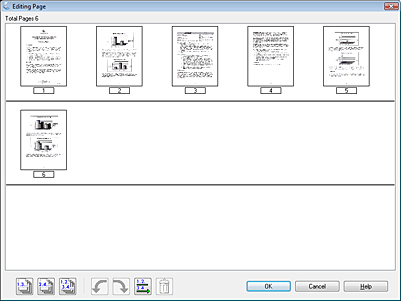
 |
Click the
 Sort by Page Number button. Your pages are automatically sorted into the correct order. Sort by Page Number button. Your pages are automatically sorted into the correct order. |
 |
Click OK. The pages are saved in one PDF file in Pictures, My Pictures, or the location you selected in the File Save Settings window, and you return to the Office Mode window.
|
 |
Click Close to exit Epson Scan.
|
